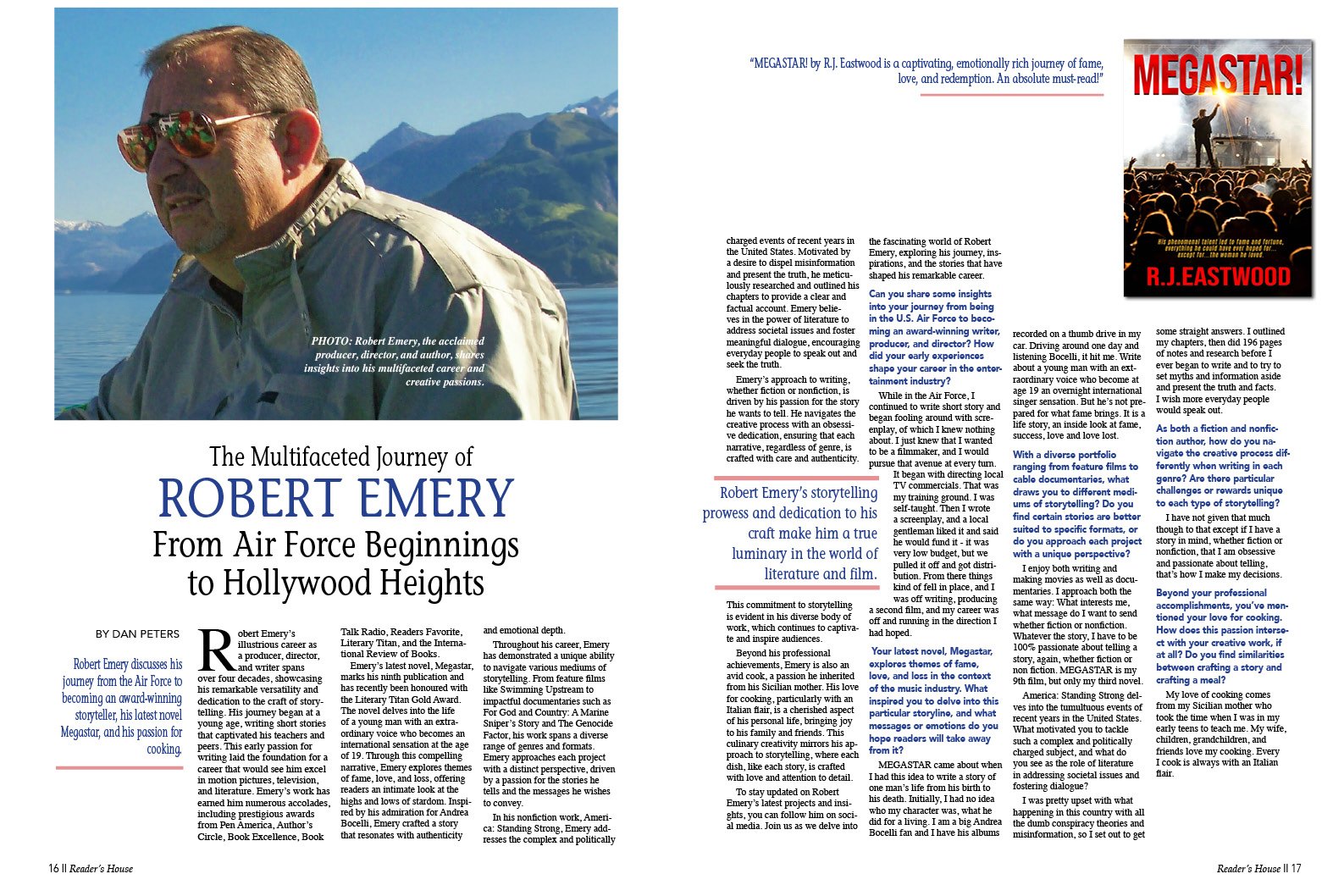From Air Force Beginnings to Hollywood Heights
Robert Emery discusses his journey from the Air Force to becoming an award-winning storyteller, his latest novel *Megastar*, and his passion for cooking.
Mr. Emery’s career as a Producer, Director, and Writer of motion pictures and television productions spans four decades. At a very early age, he began writing short stories and shared them with one of his teachers, who encouraged him to keep writing. His work in motion pictures and television eventually led him to begin writing books, both fiction and non-fiction, for which he has received many book awards, among them, Pen America, Author’s Circle, Book Excellence, Book Talk Radio, Readers Favorite, Literary Titan, International Review of Books.
His newest novel, Megastar, is his 9th publication which recently was award the Literary Titan Gold Award.
Mr. Emery’s film career began with writing and directing regional and national TV commercials, live local television, corporate films, network documentaries, and motion pictures. His award-winning productions include Swimming Upstream (feature film), “For God and Country: A Marine Snipers Story” (MSNBC), The Directors (91 episodes Starz/Encore), The Genocide Factor (4-hour mini-series PBS)
Can you share some insights into your journey from being in the U.S. Air Force to becoming an award-winning writer, producer, and director? How did your early experiences shape your career in the entertainment industry?
While in the Air Force, I continued to write short story and began fooling around with screenplay, of which I knew nothing about. I just knew that I wanted to be a filmmaker, and I would pursue that avenue at every turn. It began with directing local TV commercials. That was my training ground. I was self-taught. Then I wrote a screenplay, and a local gentleman liked it and said he would fund it – it was very low budget, but we pulled it off and got distribution. From there things kind of fell in place, and I was off writing, producing a second film, and my career was off and running in the direction I had hoped.
Your latest novel, Megastar, explores themes of fame, love, and loss in the context of the music industry. What inspired you to delve into this particular storyline, and what messages or emotions do you hope readers will take away from it?
MEGASTAR came about when I had this idea to write a story of one man’s life from his birth to his death. Initially, I had no idea who my character was, what he did for a living. I am a big Andrea Bocelli fan and I have his albums recorded on a thumb drive in my car. Driving around one day and listening Bocelli, it hit me. Write about a young man with an extraordinary voice who become at age 19 an overnight international singer sensation. But he’s not prepared for what fame brings. It is a life story, an inside look at fame, success, love and love lost.
With a diverse portfolio ranging from feature films to cable documentaries, what draws you to different mediums of storytelling? Do you find certain stories are better suited to specific formats, or do you approach each project with a unique perspective?
I enjoy both writing and making movies as well as documentaries. I approach both the same way: What interests me, what message do I want to send whether fiction or nonfiction. Whatever the story, I have to be 100% passionate about telling a story, again, whether fiction or non fiction. MEGASTAR is my 9th film, but only my third novel.
America: Standing Strong delves into the tumultuous events of recent years in the United States. What motivated you to tackle such a complex and politically charged subject, and what do you see as the role of literature in addressing societal issues and fostering dialogue?
I was pretty upset with what happening in this country with all the dumb conspiracy theories and misinformation, so I set out to get some straight answers. I outlined my chapters, then did 196 pages of notes and research before I ever began to write and to try to set myths and information aside and present the truth and facts. I wish more everyday people would speak out.
As both a fiction and nonfiction author, how do you navigate the creative process differently when writing in each genre? Are there particular challenges or rewards unique to each type of storytelling?
I have not given that much though to that except if I have a story in mind, whether fiction or nonfiction, that I am obsessive and passionate about telling, that’s how I make my decisions.
Beyond your professional accomplishments, you’ve mentioned your love for cooking. How does this passion intersect with your creative work, if at all? Do you find similarities between crafting a story and crafting a meal?
My love of cooking comes from my Sicilian mother who took the time when I was in my early teens to teach me. My wife, children, grandchildren, and friends love my cooking. Every I cook is always with an Italian flair.
Follow the author



